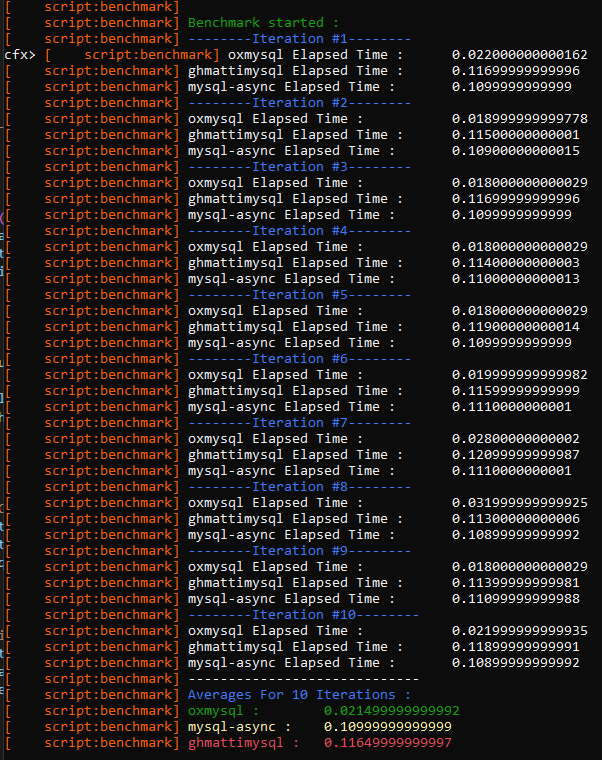Great release! I made a simple “wrapper” to make it work like old mysql-async.
MySQL.lua
MySQL = {
Async = {},
Sync = {},
}
local function safeParameters(params)
local new_param = {}
if nil == params then
return {[''] = ''}
end
assert(type(params) == "table", "A table is expected")
assert(params[1] == nil, "Parameters should not be an array, but a map (key / value pair) instead")
if next(params) == nil then
return {[''] = ''}
end
for k, v in pairs(params) do
new_param[k:gsub("@", "")] = v
end
return new_param
end
---
-- Execute a query with no result required, sync version
--
-- @param query
-- @param params
--
-- @return int Number of rows updated
--
function MySQL.Sync.execute(query, params)
assert(type(query) == "string", "The SQL Query must be a string")
query = query:gsub("@", ":")
local p = promise.new()
exports['oxmysql']:execute(query, safeParameters(params), function(result)
p:resolve(result)
end)
return Citizen.Await(p)
end
---
-- Execute a query and fetch all results in an sync way
--
-- @param query
-- @param params
--
-- @return table Query results
--
function MySQL.Sync.fetchAll(query, params)
assert(type(query) == "string", "The SQL Query must be a string")
query = query:gsub("@", ":")
local p = promise.new()
exports['oxmysql']:fetch(query, safeParameters(params), function(result)
p:resolve(result)
end)
return Citizen.Await(p)
end
---
-- Execute a query and fetch the first column of the first row, sync version
-- Useful for count function by example
--
-- @param query
-- @param params
--
-- @return mixed Value of the first column in the first row
--
function MySQL.Sync.fetchScalar(query, params)
assert(type(query) == "string", "The SQL Query must be a string")
query = query:gsub("@", ":")
local p = promise.new()
exports['oxmysql']:scalar(query, safeParameters(params), function(result)
p:resolve(result)
end)
return Citizen.Await(p)
end
---
-- Execute a query and retrieve the last id insert, sync version
--
-- @param query
-- @param params
--
-- @return mixed Value of the last insert id
--
function MySQL.Sync.insert(query, params)
assert(type(query) == "string", "The SQL Query must be a string")
query = query:gsub("@", ":")
local p = promise.new()
exports['oxmysql']:insert(query, safeParameters(params), function(result)
p:resolve(result)
end)
return Citizen.Await(p)
end
---
-- Execute a List of querys and returns bool true when all are executed successfully
--
-- @param querys
-- @param params
--
-- @return bool if the transaction was successful
--
-- function MySQL.Sync.transaction(querys, params)
-- local res = 0
-- local finishedQuery = false
-- exports['mysql-async']:mysql_transaction(query, params, function (result)
-- res = result
-- finishedQuery = true
-- end)
-- repeat Citizen.Wait(0) until finishedQuery == true
-- return res
-- end
---
-- Execute a query with no result required, async version
--
-- @param query
-- @param params
-- @param func(int)
--
function MySQL.Async.execute(query, params, func)
assert(type(query) == "string", "The SQL Query must be a string")
query = query:gsub("@", ":")
exports['oxmysql']:execute(query, safeParameters(params), func)
end
---
-- Execute a query and fetch all results in an async way
--
-- @param query
-- @param params
-- @param func(table)
--
function MySQL.Async.fetchAll(query, params, func)
assert(type(query) == "string", "The SQL Query must be a string")
query = query:gsub("@", ":")
exports['oxmysql']:fetch(query, safeParameters(params), func)
end
---
-- Execute a query and fetch the first column of the first row, async version
-- Useful for count function by example
--
-- @param query
-- @param params
-- @param func(mixed)
--
function MySQL.Async.fetchScalar(query, params, func)
assert(type(query) == "string", "The SQL Query must be a string")
query = query:gsub("@", ":")
exports['oxmysql']:fetch(query, safeParameters(params), func)
end
---
-- Execute a query and retrieve the last id insert, async version
--
-- @param query
-- @param params
-- @param func(string)
--
function MySQL.Async.insert(query, params, func)
assert(type(query) == "string", "The SQL Query must be a string")
query = query:gsub("@", ":")
exports['oxmysql']:insert(query, safeParameters(params), func)
end
---
-- Execute a List of querys and returns bool true when all are executed successfully
--
-- @param querys
-- @param params
-- @param func(bool)
--
-- function MySQL.Async.transaction(querys, params, func)
-- return exports['mysql-async']:mysql_transaction(querys, params, func)
-- end
function MySQL.ready (callback)
Citizen.CreateThread(function ()
-- add some more error handling
while GetResourceState('mysql-async') ~= 'started' do
Citizen.Wait(0)
end
callback()
end)
end
There is one problem, I didn’t know how to hook transactions. Maybe that code gonna help someone.
 on top
on top
 If it’s not possible to support, validating the input and giving user-friendly error message would be second best solution.
If it’s not possible to support, validating the input and giving user-friendly error message would be second best solution.
